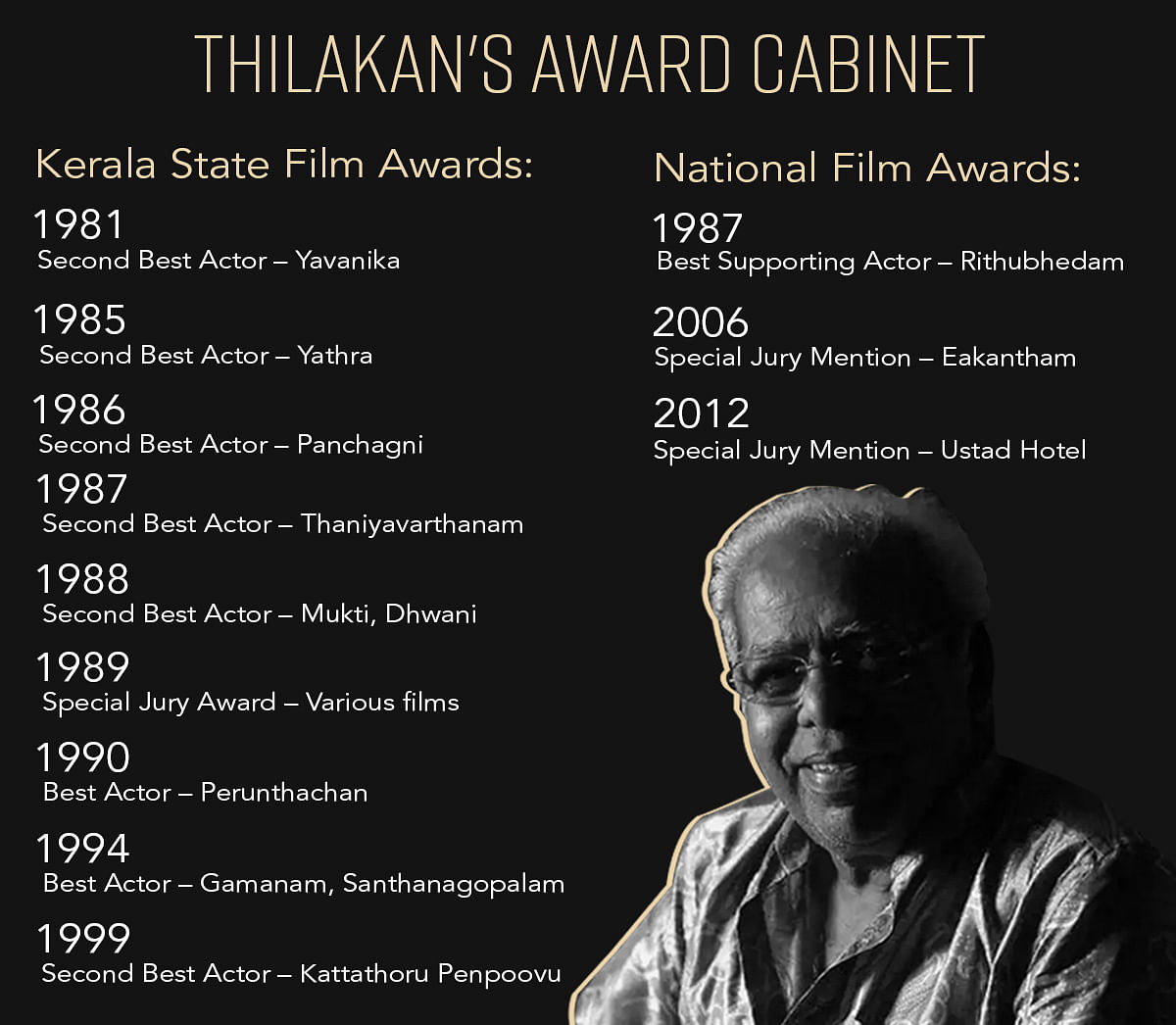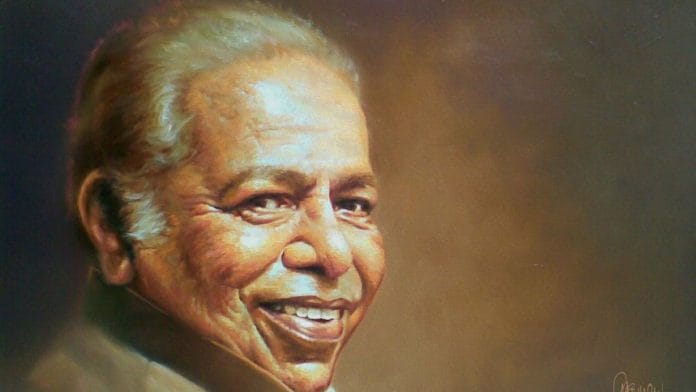Malayalam actor Thilakan was perhaps the first to point out the presence of a movie ‘mafia’ in Kerala’s film fraternity in 2010, he said that it was imposing unofficial ‘bans’. The Hema Committee Report, which came out last month, confirmed this phenomenon, but it was 12 years too late for Thilakan. He passed away on 24 September 2012.
Thilakan’s honesty and forthrightness about the Malayalam film industry’s underbelly came at a cost. At a time when ‘cancel culture’ was yet to be institutionalised, he was banned from cinema for a year-and-a-half for publicly calling out the ‘mafia’.
He was only brought back on screen, less than a year before his death on 24 September 2012, when director Ranjith defied the ban and cast him in Indian Rupee (2011).
When promoting his comeback film, Thilakan was asked if he felt that speaking out had hurt him more than those he called out.
“I have not lost anything, I have not lost roles. There is only one stakeholder who has lost out here, the audience,” he said in his signature baritone voice.
Thilakan knew he was one of the best that’s ever graced the screens and was unburdened by humility. He was quick to snuff out any voice that denied him what he was owed. He’s even called out Rajiv Gandhi, accusing the then Prime Minister of giving the National Award to Amitabh Bachchan over him for political reasons.
It was this no-nonsense demeanour and his utmost dedication to his craft that made him a darling of the masses.
Undefeated artist
Since his debut in the 1970s, Thilakan acted in over 200 films. Before his silver screen debut, he was a prolific thespian. It was theatre that came to his rescue during the ban.
Journalist Johny Lukose once said there are two Thilakans in the public eye—“One who is arrogant, contrarian, outspoken and egotistical. The other Thilakan, as director Sathyan Anthikad says, may roar like a lion but is an innocent child on the inside.” He then asked the actor which of these was the real Thilankan.
“I find it difficult to shut my eyes to the truth. I will react. That is who I am. People choose to describe that in many different ways,” Thilakan responded without missing a beat.
It’s this inability to turn away from injustice that led to an explosive interview with Asianet, resulting in his ban. He was 75 at the time.
Scriptwriter Kaloor Dennis wrote about how the actor had to go back to directing and acting on stage, while battling ill health just to make sure there was money on the table. “He wasn’t prepared to admit defeat,” Dennis wrote.
But when Thilakan recalled this period of his life in an interview with Lukose, there was not a hint of weakness.
“The clouds don’t cover the sun’s light. They simply shield our eyes from it,” he said with conviction, adding proudly that he acted in 83 plays in five months during that time.
“An artist can never be banned. Nor his talent. Art is like an ocean. Boundless,” Thilakan was quoted as saying. His three national awards and nine state awards are proof.
Dennis once called him an “encyclopedia for students of cinema”. And while he played all roles from the villainous to the comedic and everything in between, he was best known for the way he portrayed fatherhood in all its complexity. He was a self-righteous father in Perumthachan (1991), a compassionate patriarch in Ustad Hotel (2012), and a well-meaning but helpless parent in Sandesham (1991).

He expertly straddled arthouse cinema and commercial ventures with skill, making sure to never dilute his craft.
“It’s impossible to describe Thilakan’s histrionic skills, simply because neither his predecessors nor contemporaries matched him,” wrote columnist G Pramod Kumar.
Lukose once asked him why he was bothered by the remarks of others when he’s been wholeheartedly accepted by the audience.
“Why should they say the things they say?” he asked sternly. “They do it to spoil my reputation. Why should I let it lie?”
Also read: Matchbox factory owner, MP, coach—Malayali actor Innocent was never serious for too long
The Nair lobby
In the interview that led to his ban, he called out the Association of Malayalam Movie Artists (AMMA), the Film Employees Federation of Kerala (FEFKA), and a certain ‘superstar’. He had allegedly been kicked out of the movie Christian Brothers (2011) due to FEFKA’s intervention.
“One of the existing superstars said it’s his ‘prestige issue’ to keep actors like me, Captain Raju, Mala Aravindan off the screens. It means that the Malayalam film industry is led by just this one man,” Thilakan said. Based on the actor’s many interviews, many have theorised that he was referring to Dileep, the superstar who was later accused of being the mastermind behind the rape of an actor. He repeatedly called the actor a “potent poison”.
But that was not the first time the veteran had spoken up against superstars. He even said that he was not interested in doing movies with Mammooty and Mohanlal.
“I’ll act if I’m asked, but I have no interest in it. If I act, it will be for the money. There will be no sincerity in my acting. That’s because superstars centre themselves in the film,” he said to Lukose.
He was always vocally against superstardom as he felt it made actors insecure, to the point that they stifled competition. Which is what he alleges happened to him.
Thilakan was also been vocal about the issues of caste that plague the Malayalam film industry. He repeatedly called out the “Thiruvananthapuram Nair lobby” and said that being born an Ezhava cost him opportunities.
He narrated the story of him applying to be on the radio to Lukose. “It was 1955, just as I graduated college. I got a letter a few weeks after the auditions saying that my voice was not fit for broadcast,” he said. His friends convinced him to apply again, but this time with a Nair surname. “A year later, I did what they told me to. The radio station selected me.”
This followed him into the film industry and all his pleas to AMMA to take the lobby seriously fell on deaf ears. They even ridiculed him, Thilakan claimed.
He alleged that the Nair lobby was upset at him winning so many awards. “A person present at the meeting told me that they concluded that the only way to stop Thilakan from getting awards is to stop him from acting. So they conspired to get rid of me from films,” he said.
(Edited by Ratan Priya)






